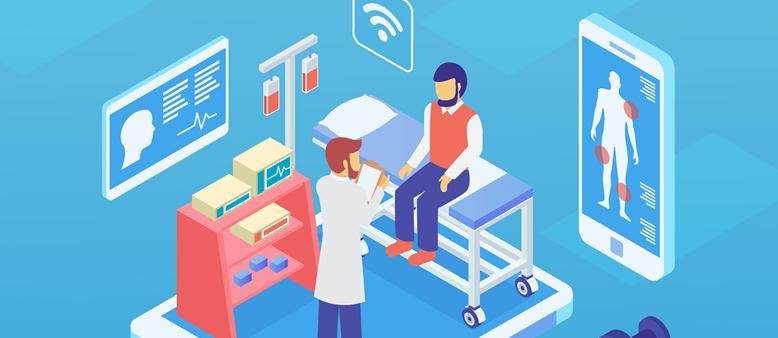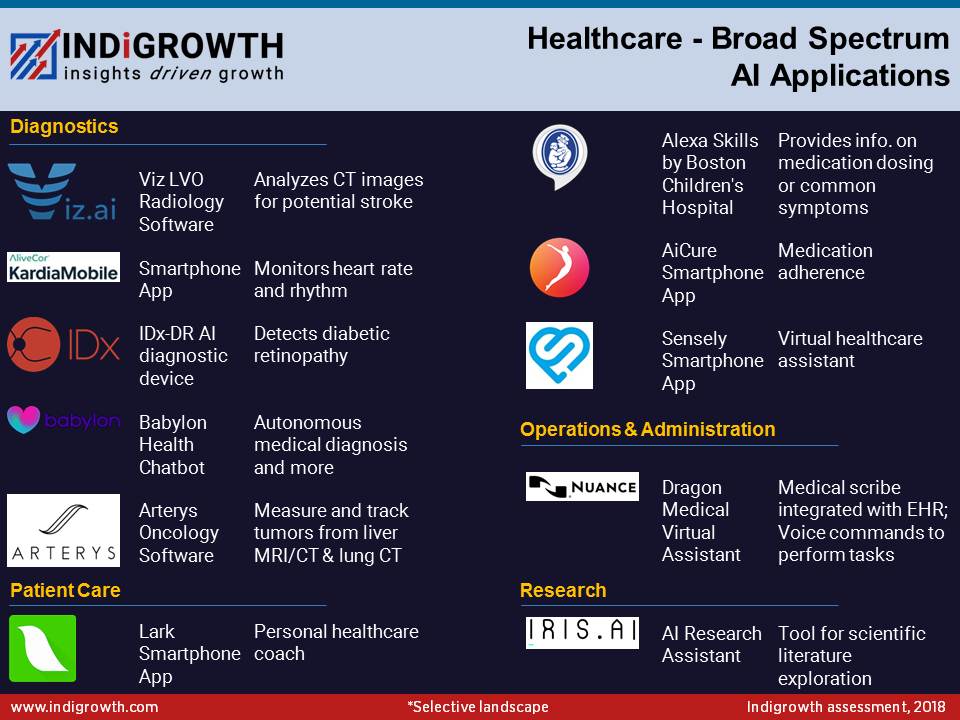From online advisory to precision medicine, AI solutions promise healthcare like never before. Academia, tech giants and startups alike have taken the plunge. This note looks at the frenzied AI activity in the healthcare space.
Potential of AI has sparked an array of use cases across the healthcare delivery chain, as providers confront rising cost of healthcare, a scenario of reduced revenues stemming from lowering reimbursements, and a shift to value-based care. Their quest for solutions was met not only by the parallel development of big data tools, techniques and sophisticated algorithms but also the availability of large volume of clinical data and medical literature for the AI tools to learn from.
Realizing AI’s potential, Mayo Clinic collaborated with IBM Watson data analytics platform in 2014 to improve clinical trial enrollment in cancer trials. The project replaced hundreds of man-hours of manual screening of patient data and matching them with trial requirements. It not only met the desired objective but helped Mayo Clinic come up with time-critically faster and better, individualized treatment plans for cancer patients.
More recently, a team of academicians from leading institutions, including Massachusetts General Hospital, OHSU, the University of Illinois at Chicago, Children’s Hospital Los Angeles, built an AI algorithm to automatically and more accurately diagnose a potential cause of childhood blindness.
AI use cases, pilots and studies are being conducted across conditions (such as cancer) and continuum of patient care (such as diagnosis), with greenfield solutions out in the field having gained FDA approval. Such is the scope of AI applications that Accenture estimates its saving potential for the US healthcare system at USD150 billion by 2026. And these solutions comprise key points in the healthcare system, such as diagnosis, clinical trial participant identifier, etc.
This no longer is an optimism exhibited by a zealous supply side. Significantly, consumers are also more open to AI-based solutions in healthcare than in other industries. According to a SAS survey during the year, 60% of people surveyed are open to doctors using AI to analyze their medical information to suggest treatment. And 52% of people over 40 are willing to undergo AI-assisted surgery.
More advanced applications such as chronic disease management, robot-assisted surgery, drug discovery, clinical trial participation and fraud detection expected to drive long-term and high-value impact in the US$3.5tn US healthcare market.
And this reflected in the hyperactivity punctuating the AI startup space. In the private market, healthcare AI startups have raised US$718mn in 2017, a 126% growth YoY.
Regulators are also stepping up approvals of artificial intelligence systems and related products. The FDA recognizes the potential in digital health tools to accurately diagnose and treat diseases as well as to enhance the delivery of health care. According to Scott Gottlieb, M.D., Commissioner of Food and Drugs, “We’re expanding on our novel model for the pre-market review of digital health tools as medical devices, through our new pre-cert program. We’re implementing a new approach to the review of artificial intelligence; and we’re announcing today a new application of digital health tools to our own work – in this case the pre-market review of drug safety.”
Iowa-based IDx’s first solution, IDx-DR is the first FDA authorized AI system for the autonomous detection of diabetic retinopathy. Started at Stanford AI research, the San Fransisco based Viz.ai was approved to analyze CT scans and notify healthcare providers of potential strokes in patients. Post FDA approval, Viz.ai closed a $21mn Series A round from Google Ventures and Kleiner Perkins Caufield & Byers. GE Ventures-backed startup Arterys was FDA-approved last year for analyzing cardiac images with its cloud AI platform. This year, the FDA cleared its liver and lung AI lesion spotting software for cancer diagnostics.
AI faces both technical and feasibility challenges that are unique to the healthcare industry. For example, there’s no standard format or central repository of patient data in the United States. In 2016, Alphabet acquired Apigee, which also develops FHIR-based healthcare APIs to connect data across systems, thereby advancing interoperability. Developers for DeepMind, Alphabet’s AI subsidiary, are also working on projects involving FHIR, like the Stream app that detects kidney injuries and sends alerts to providers. Apple is developing ResearchKit and CareKit. One combines sources of data and puts EHR data in the hands of patients and another provides aggregated patient data for clinical studies promising better success rates.
All of these healthcare AI initiatives continue to work with one mission – to improve the quality of care at reasonable cost. Ultimately, evidence supporting the clinical efficacy of AI as well as standardized and interoperable integration of AI into clinical workflows will be central to realizing that vision. For now, these have a long way to go.
Notes:
1. Artificial intelligence (AI) : Healthcare’s New Nervous System, Accenture
2. AI’s Health Exam, PitchBook, 13 March 2018
3. Image Designed by Freepik



